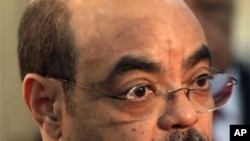This is Part 5 of a 5-part series: Sharing the Nile's Waters
Parts 1 / 2 / 3 / 4 / 5
Ethiopia is offering Egypt and Sudan an olive branch in their bitter dispute over sharing the waters of the Nile River. The offer includes possible joint ownership of a huge Ethiopian hydropower project that Egypt has tried to block.
Ethiopia’s Prime Minister Meles Zenawi launched a furious attack Friday on powerful interests seeking to prevent construction of a 5,200-megawatt dam on the Blue Nile, in the highlands along the Sudanese border.
Meles says the massive project would allow Ethiopia to earn precious foreign exchange from electricity exports. But traditional funding sources have dried up, largely due to opposition from environmentalists, as well as from Egypt, which depends almost totally on the Nile for its water supply.
Speaking to the opening session of an international hydropower conference, Meles vowed the $4.8-billion project would go ahead, even if impoverished Ethiopia has to pay the tab itself.
“We are so convinced of the justice of our cause, so sure of the strength of our arguments, so convinced of the role of our hydropower projects in eliminating poverty in our country that we will use every ounce of our strength, every dime of money that we can save to complete our program,” Meles said.
The Ethiopian leader blasted donors and lending agencies that have withheld support for the project, calling their action unjust.
“We need the support of all our partners to build the dam as our savings are inadequate,” Meles added. “If our partners are deterred from doing so because of the noisy campaign of environmental extremists and some politicians with old-fashioned ideas, they will in effect be condemning millions of Africans to poverty. That cannot be just. That cannot be fair.”
In comments to reporters after his speech, the Ethiopian leader held out hope that the post-Mubarak administration in Cairo might soften Egypt’s longstanding opposition to upstream use of Nile water.
“I am still hopeful that the current government in Egypt will recognize that this project has nothing but benefits to Egypt,” said Meles. “Nothing. I believe the Sudanese understand this has nothing but benefits to them.”
Meles said a change of heart by Cairo’s new leaders could open the way for cooperative agreements, including a deal that would give Egypt partial ownership of the dam.
“If there is a reconsideration, there will be time to consider many issues, including possibly joint ownership of the project itself. We are open to such ideas," said Meles.
Egypt’s ambassador to Ethiopia Tariq Ghuneim told VOA his country is open to negotiations to reach an amicable solution to the Nile water dispute. He said he could not comment on Meles’s proposal because he had not seen details, but said any agreement would be a “win-win” for all.
Ethiopian officials were vague on when construction of the so-called Great Millennium Dam would begin, saying only it would be ‘soon’, and would be completed in less than four years from the start date. They say it would create a reservoir of water twice as large as Lake Tana, landlocked Ethiopia’s largest body of water, but would not displace any people because it would be contained in the existing river gorge.
The Horn of Africa nation is hoping to increase its electricity generation capacity to 15,000 megawatts within 10 years. The World Bank says Ethiopia has the second greatest hydropower potential in Africa, after the Democratic Republic of Congo.




